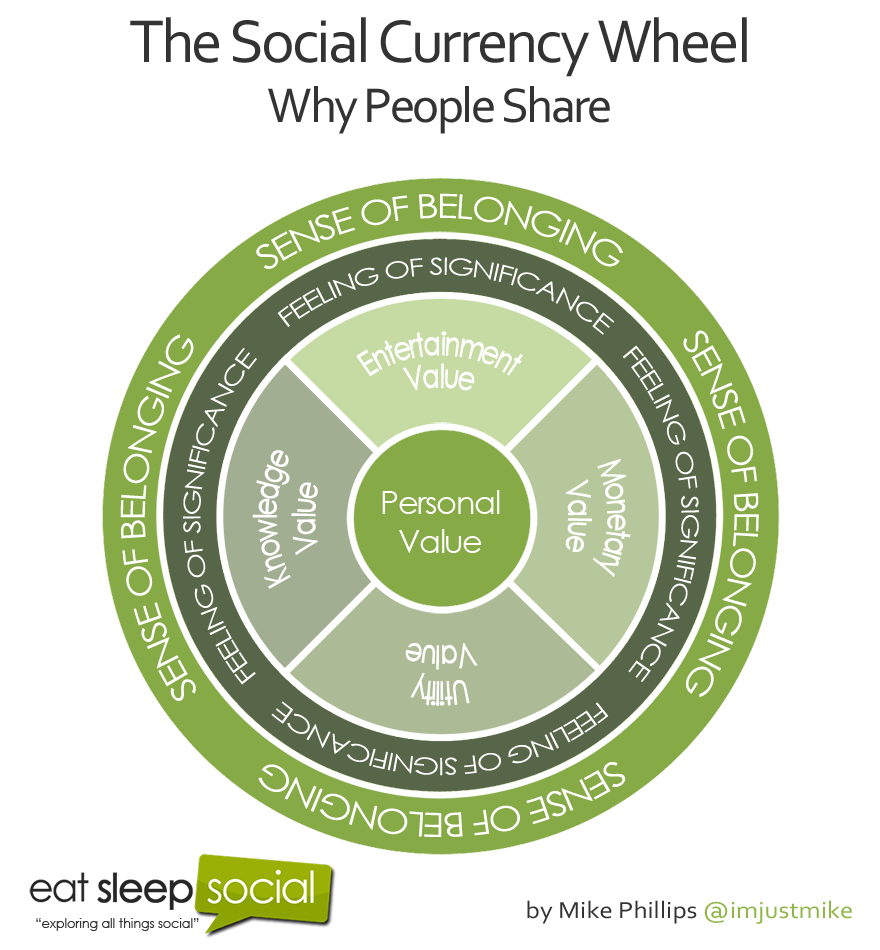The Psychology of Social Currency
Social currency is a term that is gaining popularity in the social media community, but as a concept it is not a new idea. Social currency simply refers to the value that information has when it is shared between individuals, something has a good social currency if people want to continue to share it.
A good example of social currency is gossip, people will share rumours with their friends, who in turn will share with their friends, which is why rumours can spread like wildfire. But the key to understanding social currency is to understand the psychology behind sharing, why do people want to share? Ultimately people share when it benefits them, when they get some personal value out of sharing. The single most important component of social currency is personal value.

Basic human needs
Personal value itself is typified by fulfilling two basic human needs, the need to belong and the need to feel significant.
Humans are social beings; we are compelled to identify ourselves as belonging to groups of similar people. This need to belong is the most important element of personal value – people share content to show that they belong to a certain group of people. People will join groups on Facebook to show that they belong, quite literally, to that group of people. Just as people will tend to dress themselves according to quite specific social groups, the things we share and advocate are just another way of identifying ourselves with a group.
Within these groups individuals want to feel valued in that group; they want a feeling of significance. People who share content do so to get recognition from others in that group and in doing so give themselves significance. An offline analogy is an individual in a group of friends who always wants to be the one telling jokes; they gain significance by sharing jokes with their friends.
Social currency therefore not only provides value to the end users, but also provide additional personal value as a form of currency when shared.
Four further types of Value
Personal value can be broken down into four further types of value: Utility, Knowledge, Entertainment and Monetary.
Utility
This is literally something useful, be it a piece of useful content such as a “how to” guide or a fully fledged branded utility. Branded utilities are where brands create something that provides a tangible, useful benefit to users, such as banks providing applications that allow users to compare the various interest rates
Knowledge
A different kind of value can be gained when people share knowledge within their group. This can start from people who remind their friends that a mutual friend’s birthday is approaching right through to thought leaders in industry, who produce white papers and innovative new methods of working. The personal value is a reward for individuals who share their knowledge; they are valuable members of that community.
Entertainment
Probably the oldest and certainly one of the most common, types of social currency that provides personal value from entertainment is the joke. People tell each other jokes to make members of their group laugh, just as they share funny videos with their social networks and email each other funny pictures. Providing entertaining social currency to your peers gives you significance within your peer group.
Monetary
The final type of value a user can receive from social currency is monetary or financial value. A good example is the online coupons that brands encourage their customers to share with their friends, entitling them to a discount. It is of value not only to the end user, but also to the sharer, as their community gives them kudos for sharing the discount.
Multiplying the effect
These values are not delivered in isolation however, the types of value can be combined to provide stronger social currency, with common examples including useful financial knowledge in the form of “How to live on a budget” guides or entertaining information, which explains why infographics are so widely popular.
At the end of the day, if your brand doesn’t have social currency, if the content it produces isn’t entertaining or useful, if it doesn’t share knowledge or provide a monetary benefit to users then people won’t share it. So what social currency does your brand have?
4 Comments
Leave A Comment


Agree with your article but only part of the way. In several studies of young people, and looking at what they exchange in terms of social currency, we found three basic purposes of exchange: Knowledge/Information (as a way of facilitating conversation…belonging) Brands/Possessions (as a way of expressing identity) and Competency (think skateboarders) who in furthering and sharing their skills with peers – as a way of expressing and developing one’s sense of significance.
We found individuals play all three cards, but tend to be Information dominant, Brand dominant or Skills dominant. A blessed few have a balance of all three: a hand of cards with all the aces. And the research really showed that these people had a self confidence that others lacked. On the flipside were people who really lacked any aces at all – and in a high school context they had little to exchange with others – no gossip or information, no possessions or brands, and no particular skills. They get branded as the slackers, though I always remind my clients that the slackers occasionally rise up and take over the world – think Grunge/Seattle early 90s.
To a great degree, the currency that young people choose is determined by a mixture of their own personality (gregarious or not, for example) versus their own resources. If you aren’t a football star or a half amazing skateboarder, or if can’t afford the cool brands you choose what’s available – to talk about music, TV shows, Hollywood gossip or local gossip: that is you trade the cheapest currency which is information. Pokemon Cards used to fall into this class of currency – and that was part of their huge success. They provided the outlier kids with a currency to get back into the game.
A fascinating subject. But I differ on your “Four Types of Value” analysis. I think it can be boiled down simpler. Cheers.
That sounds fascinating, is there any write up of your study? It’s worth noting that the identity and significance over lap in our views, and it could be that the knowledge / information could be where I make the split into knowledge / utility / entertainment / monetary. Maybe I was just trying to cover all the possible bases, whilst you wanted to keep it as simple as possible?
Would love to read more about your study and findings.